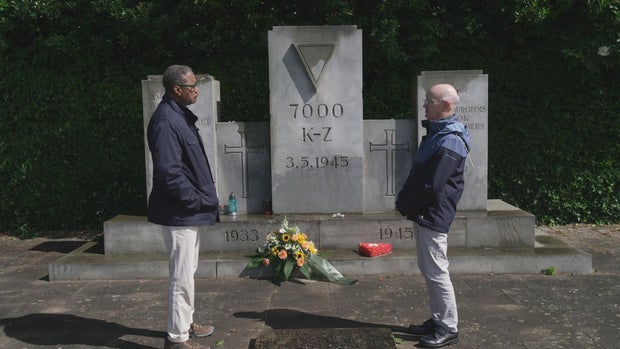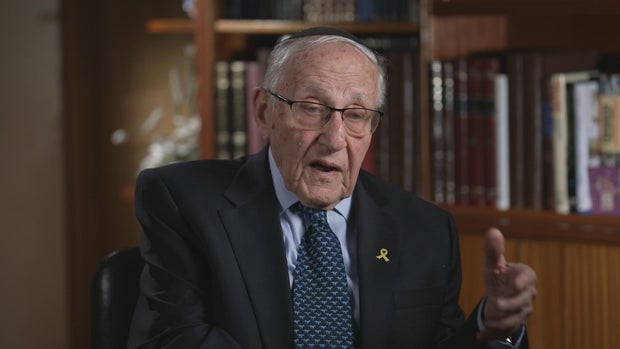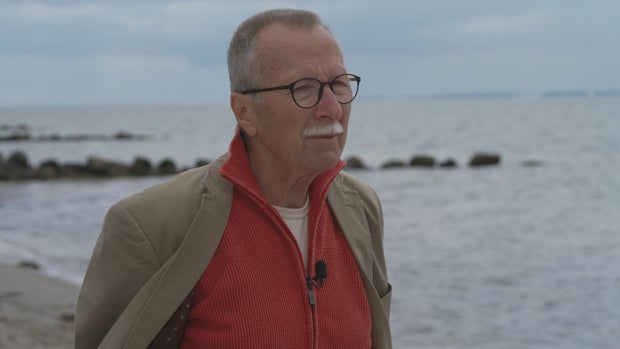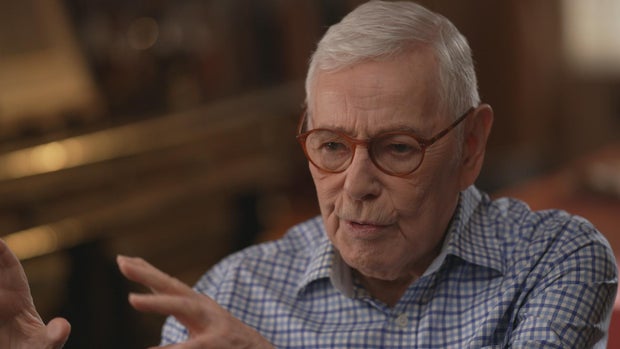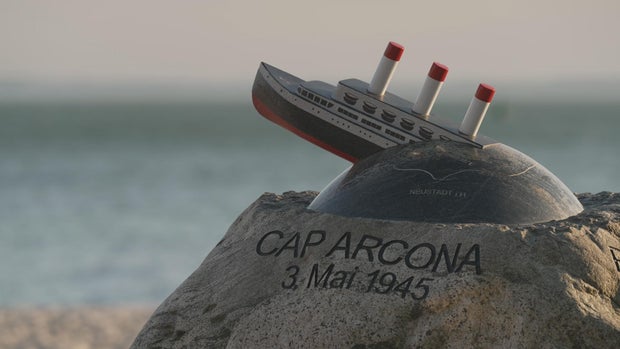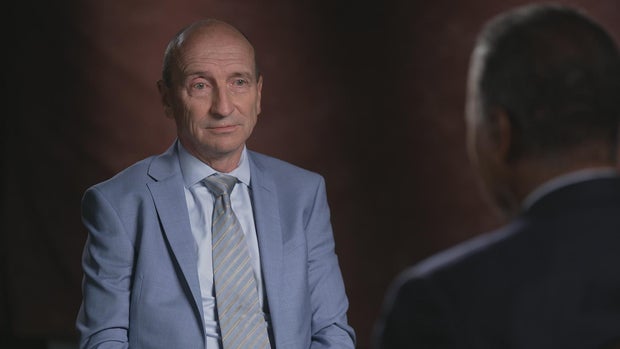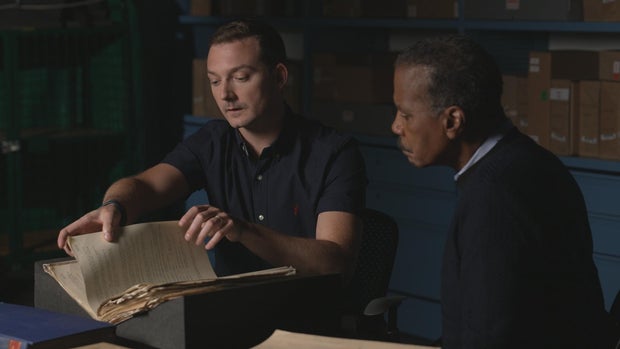CBS News
Victims’ families remember Nazi ship sunk with prisoners on board | 60 Minutes

Everyone knows the story of the Titanic, the opulent British ocean liner that struck an iceberg and sank. But it’s likely you have never heard of the Cap Arcona, a German version of the Titanic. Before World War II, the vessel was a cruise ship for the well-to-do. By the end of the war, the Nazis had transformed it into a floating concentration camp. Packed with prisoners, the Cap Arcona was anchored in Lübeck Bay in the Baltic Sea when an aerial attack just hours before liberation killed nearly everyone on board. The ship’s improbable journey from luxury liner to death trap is one of the most horrific and little known war stories we have encountered.
On sunlit days, Germany’s Baltic coast looks idyllic. But this beauty masks an unthinkable horror, one that’s etched in the local memory and on this beachside marker bearing the name Cap Arcona and the German words for fear, panic, and grief.
Bill Niven: It’s so calm, so peaceful. And yet out there is a graveyard. You can come to a place like this and just feel the weight of the history.
British historian Bill Niven has spent much of his career studying the Holocaust. We met him at Lübeck Bay, where the memory of the Cap Arcona and a smaller cargo ship bombed on May 3rd, 1945 … still haunts this shore.
Bill Whitaker: What is this place?
Bill Niven: This is a memorial– an honorary memorial to the victims of the two ships that went down, with a loss of some 7,000 lives.
Bill Niven: It recalls all the nationalities that were victims of the sinking of the ships.
Bill Whitaker: There were Americans on the ships?
Bill Niven: Yes. There were Greeks, there were Italians, and the Jewish people of course, represented here by the Star of David.
60 Minutes
Most of the victims were on the Cap Arcona. Every year on the anniversary of the attack, a somber ceremony is held at this site to remember those who perished … and those who suffered.
Bruno Neurath-Wilson: My father was one of the survivors of the sinking of the Cap Arcona.
Bruno Neurath-Wilson came to honor his father, Willi, a political prisoner held on the Cap Arcona. Only about 400 prisoners survived the attack, including Bruno’s father.
Bill Whitaker: What’s it like for you to be in this place?
Bruno Neurath-Wilson: When we go to the place where the Cap Arcona sank, I try to imagine what happened. I really cannot imagine what happened on the ship.
No one could have imagined this end for the Cap Arcona. Launched with great fanfare in 1927, the ship became known as the “Queen of the Atlantic,” transporting well-heeled passengers from Europe to South America in two weeks.
Bill Whitaker: What was it like in its heyday?
Bill Niven: Well, it was one of the most beautiful ships the Germans had. It had its own tennis court. It had a heating swimming pool. It had the most wonderful restaurant where you could look out onto the sea. The most wonderful first-class cabins.
Bill Whitaker: It was a luxury– a luxury cruise ship?
Bill Niven: It was a luxury, luxury cruise liner. Absolutely was.
The Cap Arcona traversed the Atlantic dozens of times. But in 1933, Germany underwent a sea change.
Adolf Hitler came to power.
In 1939, as German troops invaded Poland, the Nazis commandeered the Cap Arcona to serve as a floating barracks in the Baltic. Ironically, on one of its last trips before the war, the ocean liner carried some German Jewish passengers who had bought tickets to safety in South America. But most Jews had no way to escape.
Manfred Goldberg: We were rounded up and sent to the concentration camp, just the three of us, my mother, I, and my younger brother.
94-year-old Manfred Goldberg was just 11 when the Nazis forcibly removed him and other Jews from his hometown of Kassel in central Germany. He would survive confinement in the Riga, Latvia ghetto and four different concentration camps.
60 Minutes
Manfred Goldberg: The cruel experiences during my young years between 11 and 15, they’re firmly lodged clearly in my mind to this day.
In Nazi-held Latvia, Goldberg, his mother Rosa and other prisoners were forced to repair bombed out railroad tracks during the day. When they returned to camp one night, they learned the SS had taken Manfred’s little brother Hermann, and three other children. They were never seen again.
Manfred Goldberg: They just disappeared off the face of the Earth. The next morning, both my mother and I had to line up and go to work as though nothing untoward had happened.
Bill Whitaker: What did that do to you and your mother?
Manfred Goldberg: I was nearly as heartbroken as my mother at the loss of her little baby, so to speak. He was seven when he went into the camps and nine the day he disappeared.
Goldberg and his mother ended up in the Stutthof camp in Nazi-occupied Poland. Another young boy, George Schwab, was imprisoned there, too.
George Schwab: The crematorium burning, you know, bodies all the time, gassing them. Terrible.
Schwab is 92, but he was only 9 when German soldiers invaded his hometown of Liepāja, Latvia. Schwab’s father, a prominent physician, tried to protect other Jews in town.
George Schwab: He noticed SS trucks were approaching, and he waved for fellow Jews to disperse and they arrested him, knocked out one eye, threw him down the cellar, and then killed him.
Bruno’s father, Willi Neurath, was not Jewish, but he actively opposed the Nazi regime.
Bruno Neurath-Wilson: My parents belonged to the small minority of German people who fighted against the Nazis. They didn’t fight with weapons, of course.
Bill Whitaker: Fight with their words?
Bruno Neurath-Wilson: Yes. Fighting with papers, with printed papers.
Willi was arrested for distributing anti-facist fliers.
Bruno Neurath-Wilson: They brought him to Buchenwald. And– from Buchenwald, they brought him to the concentration camp Neuengamme by Hamburg.
60 Minutes
The Neuengamme work camp mostly held political prisoners. Inside this massive warehouse, historian Bill Niven told us prisoners like Willi Neurath made bricks.
Bill Whitaker: What does it feel like to walk in here?
Bill Niven: It feels like a factory of death. You can sense what went on in this place.
Bill Whitaker: But this was not a death camp, this was a work camp.
Bill Niven: It’s a very, very slim distinction. In the course of this work, they die. They die in droves.
Willi Neurath managed to survive but, as fate would have it, he, Schwab, the Goldbergs, and the Cap Arcona all would end up at Lübeck Bay, one of the last Nazi defensive positions.
In 1945, as the Allies were closing in, the Cap Arcona – now rusted and battered – was repositioned to Lübeck Bay. At the same time, SS Chief Heinrich Himmler ordered the evacuation of concentration camps.
Bill Whitaker: Why were they trying to clear these places out?
Bill Niven: There is an order by Himmler that no prisoner is to be delivered into the hands of the enemy alive. But I think the main concern was to get rid of evidence because prisoners are evidence. They can talk. They can tell. They can speak to those atrocities that were committed by the Nazis. So getting rid of the evidence meant getting rid of human beings.
Thousands of prisoners were sent to the Nazi holdout at Lübeck Bay. Willi Neurath was forced north from Neuengamme, about 50 miles. From Stutthof in the east, Manfred Goldberg, his mother, and George Schwab were sent to a nearby town, aptly named Hel, and put on barges.
Bill Whitaker: What were the conditions?
George Schwab: Oh, terrible. Just beyond description. No toilet facilities. Hardly any food. You could hardly sit, you can certainly not sleep.
Bill Whitaker: It sounds like hell.
George Schwab: Hell. Hell on Earth, absolutely.
The barges, each packed with about a thousand prisoners, were towed by tugboat for six days, about 400 miles across the Baltic to where the Cap Arcona was positioned.
The Cap Arcona arrived in Lübeck Bay on April 14, 1945, two weeks before Hitler killed himself and three weeks before the end of the war in Europe. It was anchored out there, about 2 miles offshore. With its engines barely running and little in the way of food and water, the former Queen of the Atlantic – a playground for the rich and famous – was about to become a floating concentration camp.
With nowhere to hold the amassed prisoners, SS guards jammed more than 4,000, including Willi Neurath, onto the Cap Arcona.
Bill Niven: And one must remember this is a ship that’s meant for 1,500 people. It’s not meant for 4-5,000 prisoners.
Bill Whitaker: Do we know what the Nazis intended to do with the prisoners on the ship?
Bill Niven: I think they intended them to die.
Prisoners already were dying on the barges fleeing Stutthof carrying Schwab and the Goldbergs. Once in the bay, the SS guards uncoupled the tugboats, leaving the prisoners adrift.
Bill Whitaker: They just abandoned you?
George Schwab: Abandoned. We were left alone, supposedly on minefields.
60 Minutes
Schwab and Goldberg told us, mixed in with the concentration camp victims, were a few prisoners of war. They had been better fed and better treated and they seized the opportunity.
Manfred Goldberg: They managed to pry loose some very long floorboards and began using these planks of wood as oars. And they rowed in that manner into the night. Shortly before dawn the barge run aground.
Norwegian prisoners on George Schwab’s barge took advantage of the wind blowing toward shore.
George Schwab: They came and collected the blankets that we had and made sails. And we managed to sail towards land.
Near death, but desperate to live, Schwab and the Goldbergs found the strength to climb out of their barges … only to be intercepted by the SS and German troops on the beach, who shot and killed many prisoners on the spot.
Manfred Goldberg: And we felt practically certain that we would be shot next. But instead they lined us up into a column.
George Schwab: We were told that we were going to be shipped to a liner by the name of Cap Arcona.
Manfred Goldberg: And while we stood there, we saw quite a large number of bombers, airplanes, moving overhead.
At the beginning of May 1945, the war in Europe was all but over. Adolf Hitler was dead, German forces were in retreat, and the Third Reich was crumbling. One of the last Nazi defensive positions was at Lübeck Bay in the Baltic Sea, where German ships fled seeking safe harbor – including the Cap Arcona, a luxury ocean liner commandeered by the Nazis for the war effort. As the Allies closed in, the SS evacuated concentration camps and packed thousands of prisoners onto the Cap Arcona.
Around noon on May 3rd 1945, 13-year-old George Schwab was ordered to line up to board the ship.
George Schwab: But the Cap Arcona could not come close to shore, because it was a large liner.
Bill Whitaker: It’s a big ship.
George Schwab: So we were going to be transported to the Cap Arcona by another ship. I was in the back of the line. I was in no hurry.
Bill Whitaker: You purposely got to the back of the line–
George Schwab: Back– back of the line.
He was at a dock near this German naval base, where Manfred Goldberg and his mother were lined up too.
Manfred Goldberg: And it is while we stood there that we witnessed bombers, and fighter planes coming along.
Bill Whitaker: Could you see any markings on the planes?
Manfred Goldberg: No. We had no idea what nationality they were.
Bill Whitaker: You could see the planes coming in.
Manfred Goldberg: Oh, you could see the planes clearly.
Bill Whitaker: And you could– you could– see the bombs be–
Manfred Goldberg: You could see the bombs dropping.
Bill Whitaker: Can you remember what it sounded like?
Manfred Goldberg: There were some pretty powerful explosions, and there were quite a few.
60 Minutes
The Cap Arcona was hit. With more than 4,000 prisoners on board, the floating concentration camp became a fiery tomb. In a hard-to-believe turn of events, the attackers were British Typhoon fighters like these, part of the Allied forces moving in to finish off the Nazis.
Bill Whitaker: The British came to liberate these prisoners–
Bill Niven: They did, yeah.
Bill Whitaker: And ended up killing–
Bill Niven: Yeah.
Bill Whitaker: –thousands of them. It’s like horror on top of horror.
Bill Niven: It is. And yet, some of them did survive to remember it.
Bill Niven is a British historian and scholar of the Holocaust. He told us the mistaken attack on the Cap Arcona and a smaller ship is one of the most wrenching tragedies of the war.
Bill Niven: The prisoners– knew that the war was nearing its end. I think a lot of them probably had hopes that they would survive, and that gave them the strength and the courage to hang on.
At the Cap Arcona museum in the town of Neustadt by Lübeck Bay, he described the attack. British Typhoons struck in waves. The Cap Arcona was hit around 3 p.m.
Bill Whitaker: Do you have any idea how many bombs were dropped on the ship?
Bill Niven: Some people say 60 or over 60. You can imagine the panic and the horror that broke out when the bombs hit the ship, especially for those concentration camp prisoners who were on the very lower decks of the ship. And they were unable to get up– to the top because of the flames.
Bill Whitaker: Is this the worst case of friendly fire in the Royal Air Force’s history?
Sebastian Cox: Quite probably, yeah.
Sebastian Cox is chief historian for Britain’s Royal Air Force … the RAF. He blames the incident on the fog of war.
Bill Whitaker: Why was the Cap Arcona– targeted?
60 Minutes
Sebastian Cox: Because– the Allies believed that there was gonna be an attempt to flee– by certain Nazi elements across the Baltic to Norway and, and essentially continue the war.
Bill Whitaker: Did the British military have any idea that concentration camp survivors were on the Cap Arcona?
Sebastian Cox: If you mean, “Did the pilots have any idea,” absolutely not.
But other members of the British military did know.
Daniel Long: What we learned from the records that the British were handed two opportunities very close to the 3rd of May in regards to the placement of prisoners on board the ship.
Bill Whitaker: Concentration camp prisoners on those ships.
Daniel Long: Indeed.
Daniel Long wrote his PhD history thesis on the attack on the Cap Arcona. We met him at the British National Archives in London where he showed us these fragile war documents.
Daniel Long: This is the only official investigation that was carried out into the tragic sinking of the Cap Arcona.
Shortly after the bombing a British war crimes investigator interviewed the intelligence officer for the squadrons that attacked the Cap Arcona and other ships in the bay.
Daniel Long: The intelligence officer admitted on two occasions that a message was received on the second of May, 1945, that the ships had been loaded with concentration camp prisoners.
That intelligence came in the day before the attack.
Daniel Long: Which then leads to suggest there was ample time to warn the pilots on the planes.
Bill Whitaker: That information did not make it t– to the RAF pilots.
Daniel Long: That’s– that’s correct.
60 Minutes
The report does not say why the intelligence officer failed to inform the pilots, but it did blame RAF personnel for the error and called for further inquiry.
Bill Whitaker: The report strongly urged that there be a follow-up investigation. That has never happened, has it?
Sebastian Cox: Not to my knowledge.
Bill Whitaker: Why not?
Sebastian Cox: Attempting to, you know, conduct a detailed investigation would, in many respects, be a little pointless. What are– what are you going to conclude? You’ve–
Bill Whitaker: To find out what went wrong, what mistakes were made?
Sebastian Cox: We know what happened. The RAF made a mistake. An individual made a very tragic mistake and we know the consequences.
About 7,000 prisoners perished when the ships were bombed in the bay. Of the more than 4,000 on the Cap Arcona, only about 400 survived. Bill Niven told us several survivors later wrote accounts of the hell they endured at sea.
Bill Niven: (Reading from German document)
Bill Niven: Thousands of prisoners were packed together like herrings.
Bill Niven: (Reading from German document)
Bill Niven: So they stretched their arms up then they cried out, “I want out. I want out.” This is really quite terrible, to have to read this. The fire suddenly got more and more intensive, and this was because the flesh of the prisoners was burning so strongly. It made this intensity happen. It’s distressing to read.
Bruno Neurath-Wilson’s father Willi, a political prisoner, was trapped on the ship when the bombs hit.
Bruno Neurath-Wilson: My father– managed to go to the back– of the ship, where it was not burning. And there he survived be– because he couldn’t swim.
Bill Whitaker: He survived because he couldn’t swim?
Bruno Neurath-Wilson: He couldn’t swim be– he did not jump into the water. And prisoners who jumped into the water were shot by the SS.
When the British realized their mistake, they dispatched rescuers who plucked Willi Neurath and others from the listing deck of the Aap Arcona and took them to shore.
Bill Whitaker: This is the stretch of beach where your father came ashore.
Bruno Neurath-Wilson: This front of the beach, yes.
Bruno told us, in an improbable twist of fate, his mother Eva, a naval staff assistant, had been transferred to the naval base at Lübeck Bay. When she saw the bombing, she was drawn to the beach.
Bruno Neurath-Wilson: She had only one hope to know: Where is my husband? Is he still living? And maybe my husband is on the ship.
Bill Whitaker: How did they find each other?
Bruno Neurath-Wilson: She came from this direction and she saw a man coming towards her. She didn’t recognize the one person she wanted to see.
Bill Whitaker: He must have been thin and weak.
Bruno Neurath-Wilson: And dirty from the burning. But he came over to her, and– called his nickname he had for her, Muppel.
Bill Whitaker: What does Muppel mean?
Bruno Neurath-Wilson: Muppel means something like, “I love your round face.” She recognized his voice by this one word, “Muppel.”
Bill Whitaker: That ship was a graveyard for so many people. But yet it brought your parents back together.
Bruno Neurath-Wilson: Yeah. I don’t know if there are hidden meanings in life. But one meaning can be that I am– I am alive now and can tell you about this story.
As for George Schwab, he pulled inspiration from the horror.
George Schwab: This is a prize for having helped Latvia get into NATO.
The native of Latvia moved to New York, earned a PhD in political science, and had an illustrious career as an academic and peace broker.
George Schwab: Here I’m with King Hussein.
Bill Whitaker: Bill Clinton.
George Schwab: –and Bill Clinton.
Bill Whitaker: Dr. Schwab, I think you knew everyone.
George Schwab: Somewhat (laugh)
Manfred Goldberg and his mother settled in London. She passed away in 1961. Goldberg married, started a business and a family. In 2017 he returned to the Stutthof Concentration Camp with the then duke and duchess of Cambridge. He has made it his life mission to share his story.
Manfred Goldberg: I consider that part of my revenge on the Nazis. They wanted to exterminate us. And here we are, not only having survived, we are now great-grandparents.
Bill Whitaker: That’s your revenge.
Manfred Goldberg: My revenge on the Nazis, yes.
The Cap Arcona lay half-sunken in Lübeck Bay for four years before being dismantled. But the story has lain beneath the surface – little known beyond this Baltic Coast. It’s now tradition, on the third of May, for families of victims and survivors to sail to the site where the ship was bombed. They want the world to remember.
Produced by Marc Lieberman. Associate producer, Cassidy McDonald. Field associate producer, Anna Noryskiewicz. Broadcast associate, Mariah Johnson and Mariah B. Campbell. Edited by Warren Lustig.
CBS News
How to watch the Minnesota Vikings vs. Chicago Bears NFL game today: Livestream options, more

Getty Images
The Minnesota Vikings will take on the Chicago Bears today. The Vikings are currently 8-2, an impressive run so far this season, and will be looking to add a fourth win to their current streak after last Sunday’s 23-13 win against the Tennessee Titans. The Bears, on the other hand, are entering this game on the heels of a four-game losing streak after a tough 20-19 loss against the Green Bay Packers last Sunday.
Here’s how and when you can watch the Vikings vs. Bears game today, whether or not you have cable.
How and when to watch the Minnesota Vikings vs. Chicago Bears
The Vikings vs. Bears game will be played on Sunday, November 24, 2024 at 1:00 p.m. ET (11:00 a.m. PT). The game will air on Fox and stream on Fubo and the platforms featured below.
How and when to watch the Minnesota Vikings vs. Chicago Bears game without cable
You can watch this week’s NFL game on Fox via several streaming services. All you need is an internet connection and one of the top options outlined below.
Fubo offers you an easy, user-friendly way to watch NFL games on CBS, Fox, NBC, ABC, ESPN, and NFL Network, plus NCAA football channels. The Pro tier includes 200+ channels and unlimited DVR, while the Elite with Sports Plus tier adds NFL RedZone and 4K resolution. New subscribers get a seven-day free trial and all plans allow streaming on up to 10 screens simultaneously.
You can watch today’s game with a subscription to Sling’s Orange + Blue tier, which includes ESPN, ABC, NBC, and Fox. The plan offers 46 channels with local NFL games, nationally broadcast games and 50 hours of DVR storage. For complete NFL coverage, add Paramount+ to get CBS games, or upgrade with the Sports Extra add-on for additional sports channels like Golf Channel, NBA TV and NFL RedZone.
Watching NFL games, including Fox broadcasts, is simple with Hulu + Live TV, which includes 90 channels, unlimited DVR storage, and access to NFL preseason games, live regular season games and studio shows. The service includes ESPN+ and Disney+ in the subscription.
Want to watch today’s game live on your smartphone? If so, NFL+ streaming service is the solution you’re looking for. It lets you watch NFL Network and out-of-market games on mobile devices, with an upgrade option to NFL+ Premium that includes NFL RedZone for watching up to eight games simultaneously. Note that NFL+ only works on phones and tablets, not TVs.
CBS News
How to watch the Detroit Lions vs. Indianapolis Colts NFL game today: Livestream options, more

Nic Antaya/Getty Images
The Detroit Lions will face off against the Indianapolis Colts today. The Lions enter this game as top contenders with a near-perfect record of 9-1 so far this season. The Colts, who are 5-6 this season, could have a tough game on their hands against the Lions but will be looking to rack up another win after prevailing over the New York Jets in a tight game last Sunday.
Here’s how and when you can watch the Colts vs. Lions game today, whether or not you have cable.
Here’s how and when to watch the Detroit Lions vs. Indianapolis Colts
The Lions vs. Colts game will be played on Sunday, November 24, 2024 at 1:00 p.m. ET (11:00 a.m. PT). The game will air on Fox and stream on Fubo and the platforms featured below.
How and when to watch the Detroit Lions vs. Indianapolis Colts game without cable
You can watch this week’s NFL game on Fox via several streaming services. All you need is an internet connection and one of the top options outlined below.
Experience NFL action like never before with Fubo’s comprehensive sports streaming platform. From Sunday showdowns to primetime matchups, catch every NFL game across major networks including CBS, Fox, NBC, ABC, ESPN and NFL Network. Choose the Pro package to unlock 200+ channels and limitless DVR storage, or elevate your game-day experience with the Elite with Sports Plus package, featuring NFL RedZone’s commercial-free scoring highlights and stunning 4K quality.
Test drive the service with a no-commitment seven-day free trial, and share the excitement with family and friends — Fubo supports simultaneous streaming on up to 10 devices, so everyone can watch their favorite teams.
You can watch today’s game with a subscription to Sling’s Orange + Blue tier, which includes ESPN, ABC, NBC, and Fox. The plan offers 46 channels with local NFL games, nationally broadcast games, and 50 hours of DVR storage. For complete NFL coverage, add Paramount+ to get CBS games, or upgrade with the Sports Extra add-on for additional sports channels like Golf Channel, NBA TV and NFL RedZone.
Watching NFL games, including Fox broadcasts, is simple with Hulu + Live TV, which includes 90 channels, unlimited DVR storage, and access to NFL preseason games, live regular season games and studio shows. The service includes ESPN+ and Disney+ in the subscription.
Want to watch today’s game live on your smartphone? If so, NFL+ streaming service is the solution you’re looking for. It lets you watch NFL Network and out-of-market games on mobile devices, with an upgrade option to NFL+ Premium that includes NFL RedZone for watching up to eight games simultaneously. Note that NFL+ only works on phones and tablets, not TVs.
CBS News
How to watch the New England Patriots vs. Miami Dolphins NFL game today: Livestream options, more

Getty Images
The New England Patriots will face off against the Miami Dolphins in a game today at the Hard Rock Stadium in Miami. The Patriots have had an uneven season so far, coming into the game with a record of 3-8, including a 28-22 loss to the Los Angeles Rams on November 17. The Dolphins, however, haven’t fared much better this season as they enter the game with a record of 4-6, although they are coming off two wins in a row, the latest against the Las Vegas Raiders last weekend.
Keep reading to find out how and when to watch the New England Patriots vs. Miami Dolphins game today, even without cable.
CBS, Paramount+ and CBS Essentials are all subsidiaries of Paramount Global.
How and when to watch the New England Patriots vs. Miami Dolphins game today
The New England Patriots vs. Miami Dolphins game will be played on Sunday, November 24, 2024 at 1:00 p.m. ET (10:00 a.m. PT). The football game will be shown on CBS and streamed on Paramount+ and the platforms noted below.
How and when to watch the New England Patriots vs. Miami Dolphins game without cable
While CBS is available with many basic cable packages, you’ll have other viewing options, too for the Patriots-Dolphins game. Just understand that the below streaming options will require the use of an internet provider:
Paramount+: Watch CBS-aired NFL games without cable
With Paramount+ you’ll have multiple viewing options to choose from. You can catch NFL games on the Paramount+ Essential tier for just $7.99 each month or you can watch college football with a Paramount+ with Showtime subscription for $12.99 monthly. In addition to live streams of NFL games airing on CBS, you’ll get to watch additional live sporting events including NCAA college football, PGA Tour golf, soccer and more.
Get started with Paramount+ here today.
Amazon Prime Video: Add Paramount+ to your existing subscription
Already have an Amazon Prime Video account? Simply add Paramount+ to your current subscription to watch all the CBS-aired NFL games in addition to Paramount+ originals. The same prices from above apply, depending on which tier you choose. Not sure which is best for you? Don’t worry. Both options come with a free seven-day trial that can help you decide.
Watch the Patriots-Dolphins game on Amazon Prime Video.
Fubo: Watch the Patriots-Dolphins game for free
Looking for an inexpensive way to watch football? Fubo could be the best way to do so. The live TV streamer is currently offering a seven-day free trial and $30 off of your first month’s subscription. Once subscribed, you’ll gain access to all of their live sporting events immediately. And there will be a lot to choose from. Not only does Fubo come with access to NFL games airing on your local CBS channel, it also includes Fox Sunday NFC games, “Sunday Night Football” on NBC, “Monday Night Football” on ABC and ESPN and all of the games that air on the NFL Network. So don’t wait.
Get started with Fubo online now.


